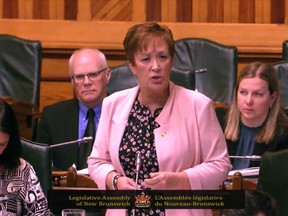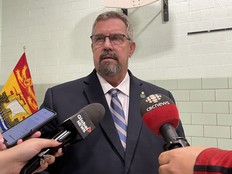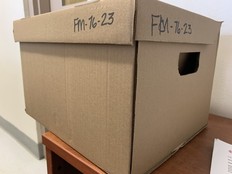Family farms in crisis, despite record revenues: critic
Green MLA says Tory government favours big farming interests over the little guy, but minister argues he has it all wrong

Article content
The only farmer in New Brunswick’s legislature says it’s high time the Progressive Conservative government admitted family farms are in crisis.
Kevin Arseneau, the Green MLA for Kent North, lashed out at Margaret Johnson, the agriculture minister, during spending estimates in the legislature on Wednesday.
Johnson had just delivered an introduction pointing out that farm cash receipts in the province – farmers’ gross revenues, including government support – were a record $1.2 billion in 2023, up from just over $1.1 billion the year before.
“In France and Germany they’re talking about an agricultural crisis, and even in Quebec, Premier Legault is talking about an agricultural crisis,” Arseneau said, referring to François Legault, who’s led a Coalition Avenir Québec government since 2018 and last month spoke about the plight of farmers in the neighbouring province.
“The money is not going to farmers, it’s going to the banks because the debt of farmers is up. And net revenue is down. You’re talking about gross revenue all you want, that money is not going to farmers. It’s not going to the small, medium farmers,” he said, before turning his ire against successful families who run private agricultural operations, principally potatoes and blueberries. “It’s going to the Irvings, the Braggs and the McCains.”
Johnson responded that there were tremendous opportunities in New Brunswick agriculture.
“I’m not looking at it with rose-coloured glasses,” she said. “We recognize there are challenges, but we continue to work with our farmers, and I like to focus on the fact there’s great work going on in this sector, and we like to support those doing great work.”
In her preliminary remarks and a news release issued just the day before, Johnson acknowledged that costs for farmers were also going up, as inflation, including higher fuel prices, takes a large bite out of their revenues.
She said some of the strongest growth in farm revenue included a $91-million increase in potato receipts (with potatoes and potato products still leading agriculture and agri-food exports in the province) and a $109-million increase in livestock receipts. The sector also saw revenues rise in flower growing, grains, maple products, vegetables and eggs.
Agriculture remains an important sector, with 9,950 full-year jobs in the province’s industry.
Money is not going to farmers. It’s not going to the small, medium farmers. It’s going to the Irvings, the Braggs and the McCains.
Kevin Arseneau
Still, Arseneau said he knew of many farmers who took up a life of labour on the land who had parked their tractors permanently.
He’s a member of the Ferme Terre Partagée workers’ co-operative, a farm that produces organic fruit and vegetables and raises animals.
“We are losing the farming tradition in New Brunswick,” he said. “There’s no money to make. You can’t pay bills with passion. People have the passion but they can’t make enough revenue because we’re being completely squeezed out by major players in this province that do not have agriculture at heart at all. All they see is the money sign, that’s it.”
Johnson said the provincial government had plenty of programs to help new entrants and immigrants take up farming. Last year alone, her department helped 35 new agricultural businesses get started, and she said in May it would launch a new website that would provide a roadmap for people to develop a farm of their own with the support of government.
Her department has already launched a buy local food and beverage campaign to encourage public institutions to support New Brunswick farmers.
“For example, the Saint John Regional Hospital has at least two local food items on its menu every day, and the provincial parks are selling an Indigenous food product, Jenna’s Nut-Free Dessertery bannock kits,” she said. “We continue to have conversations to ensure we have local products into our schools.”
Arseneau could barely contain his disgust. He said he liked Jenna’s product, but the fact was few of the ingredients were grown by local farmers.
He said the department’s programs were failing farmers.
“I know you know this. Putting a program in place is not just to respond to public pressure. It’s to actually make something work. But this department has worked in the silo of big business controlling New Brunswick agriculture for the past 50 years and it’s time for a paradigm shift.”












Postmedia is committed to maintaining a lively but civil forum for discussion. Please keep comments relevant and respectful. Comments may take up to an hour to appear on the site. You will receive an email if there is a reply to your comment, an update to a thread you follow or if a user you follow comments. Visit our Community Guidelines for more information.